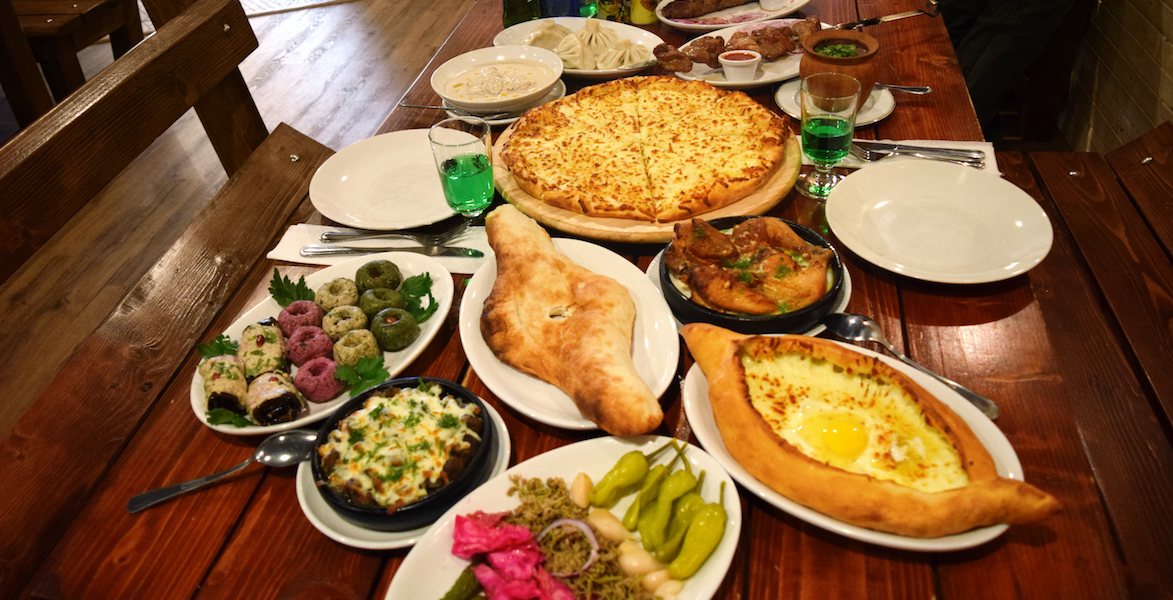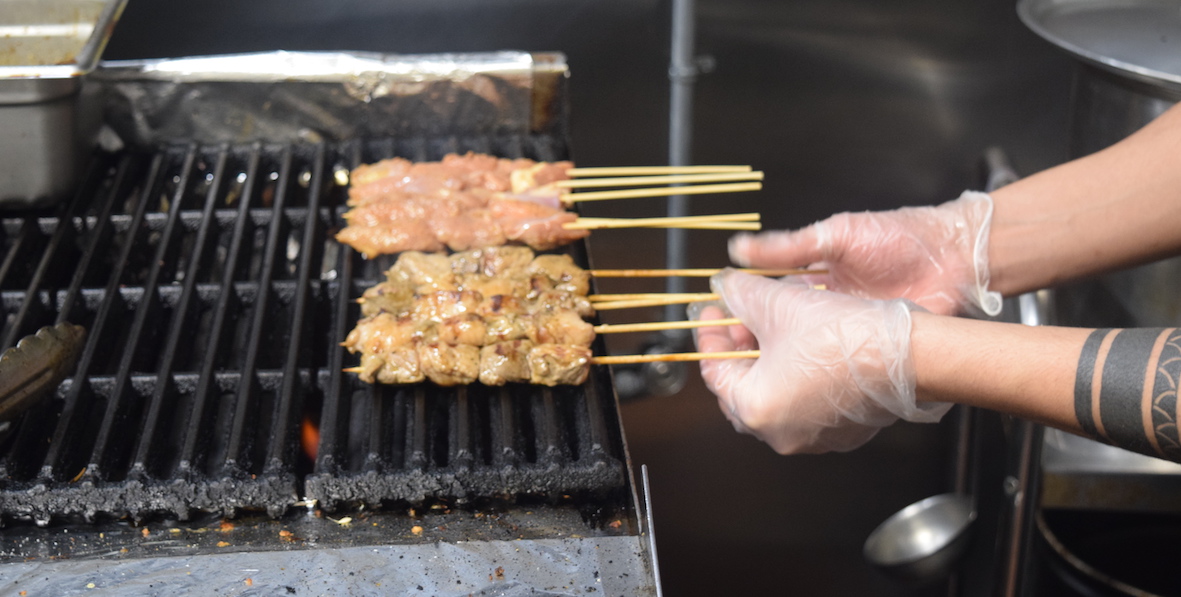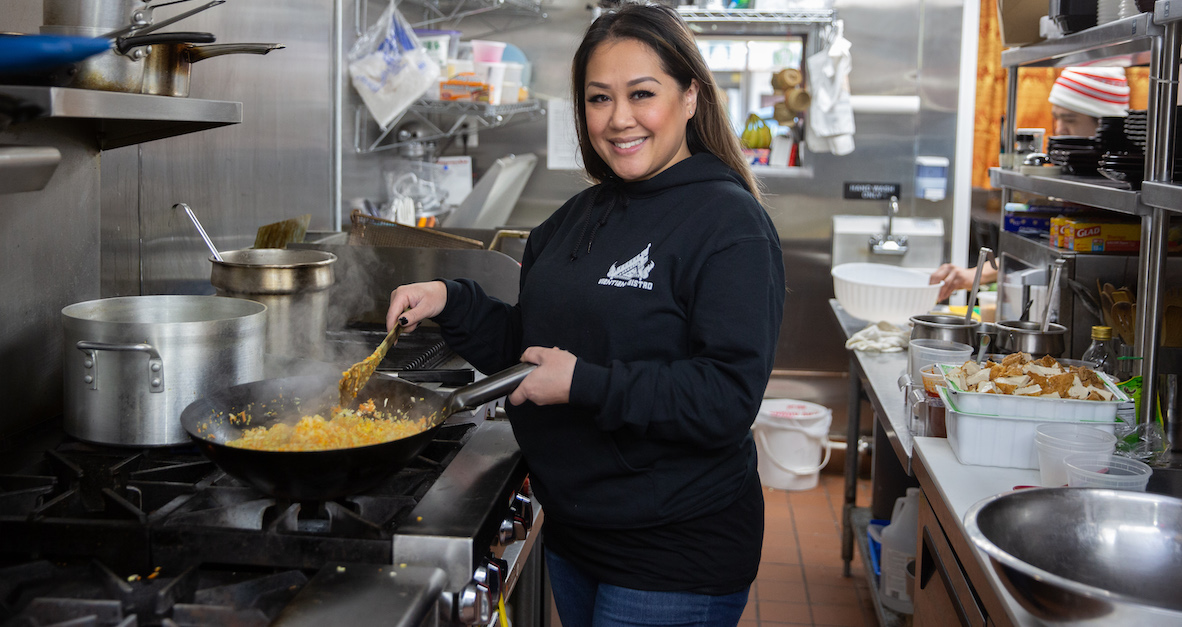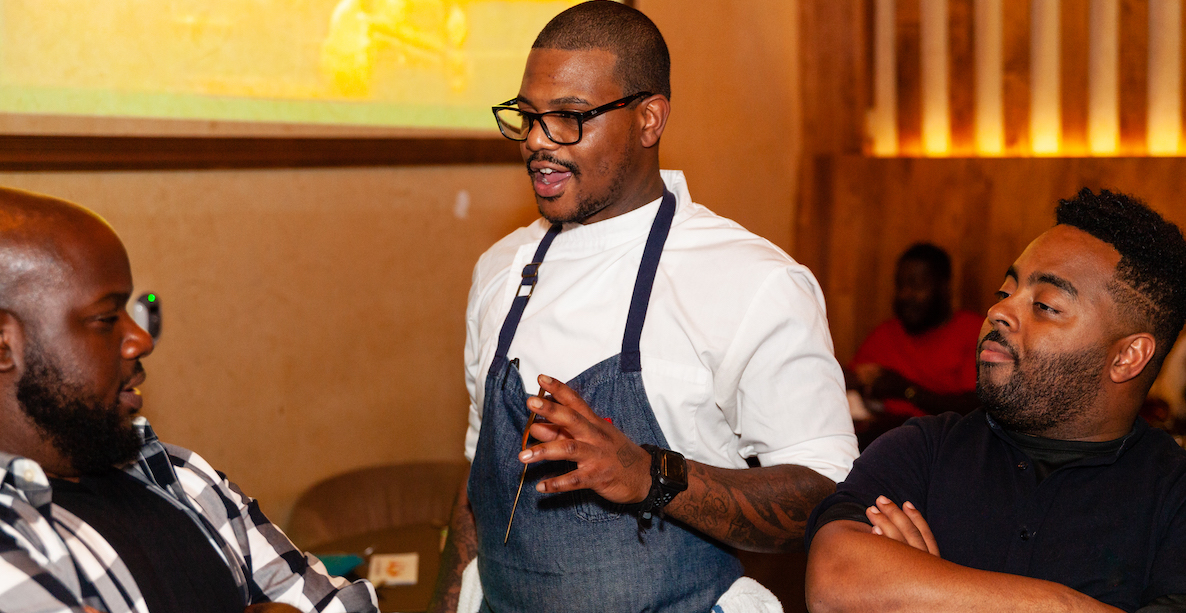In his forthcoming book, Notes from a Young Black Chef, Kwame Onwuachi—former Top Chef contestant and executive chef at Kith and Kin in Washington, D.C.—recounts a time when he was asked to create an “African American-themed” menu for a special dinner at the National Museum of African American History and Culture. At first, he bristled at the idea. “I don’t do ‘African-American-themed’ menus,” he writes. “I am an African-American chef, so if I cook my food, isn’t every menu I create African American by default?”
I was thinking about Onwuachi’s memoir recently when I attended a couple of Cooking for the Culture pop-up dinners in Philadelphia, put on by a group of the city’s young, up-and-coming African-American chefs. At the start of both dinners, organizer Elijah Milligan stood before diners and summed up their approach: “We want to stay away from soul food.”
The first Cooking for the Culture dinner I attended, an eight-course Indian-themed menu cooked by eight different chefs at Haute Restaurant Lounge, certainly fit the mission: Grilled paneer by Abu Pettiford of Plenty Cafe, chicken tikka from Demarcus Sumpter of Chubb Hotel in Lafayette Hill, sesame yogurt potato from Jena Harris of 1149 Cooperative, curry shrimp from Shawn Robinson from Relish, tandoori mushrooms from Joey Ross from Pyramid Club.
Perhaps my two favorite dishes were a tasty butter chicken cooked by Nana Wilmot (whose work as a line cook at Stephen Starr’s Le Coucou in New York was profiled in Bon Appetit last year) and the goat korma served by Aziza Young, chef at Lavi BYOB in Ardmore and who has appeared on the reality show, Hell’s Kitchen.
![]()
“We’ll cook anything,” Milligan told me when I spoke with him later. “We’ll do old-world French, modern Spanish, Filipino-meets-Mexican. Anything except soul food.” Not that Milligan has anything against soul food. His family owned soul food restaurants in Philadelphia, and he grew up cooking in those kitchens as a teenager. But after being trained in classical French at culinary school, he’s worked with pretty much every major chef and restaurateur in Philadelphia, with turns at Le Bec Fin, Parc, Distrito, Vernick, a.kitchen, and others.
Milligan eventually moved out to the Bay Area for a few years, where he worked with Dominique Crenn, whose restaurant Atelier Crenn in San Francisco was awarded three Michelin stars. Milligan then spent some time cooking in Napa Valley, where he began to feel isolated. “I was often thinking, ‘I’m the only black person here.’ And I was definitely one of the only African-American chefs,” he said.
Almost 14 percent of food service workers in 2017 identified as black or African American. But most of those jobs are in the lower ranks of fine dining. And workers of color receive 56 percent lower earnings when compared to equally qualified white employees.
When he returned to Philadelphia last summer, Milligan ran into a former mentor, a fellow black chef, whose career had stalled. “When I ran into him, I saw that he never really got the chance to grow,” Milligan said. “I was one of the lucky ones. I was lucky enough to have a lot of great chefs mentor me. But there isn’t a fair playing field in the restaurant scene.”
That’s when Milligan saw the need to start Cooking for the Culture, to showcase and promote the talent of Philly’s young black chefs. The series was an immediate success, selling out more than 60 tickets for each event. “We were supposed to do one dinner. I never thought this would trump all my other projects,” said Milligan, who currently does consulting, private catering, and food styling while he works on the launch of a yet-to-be-revealed project. “Something like Cooking for the Culture was long overdue.”
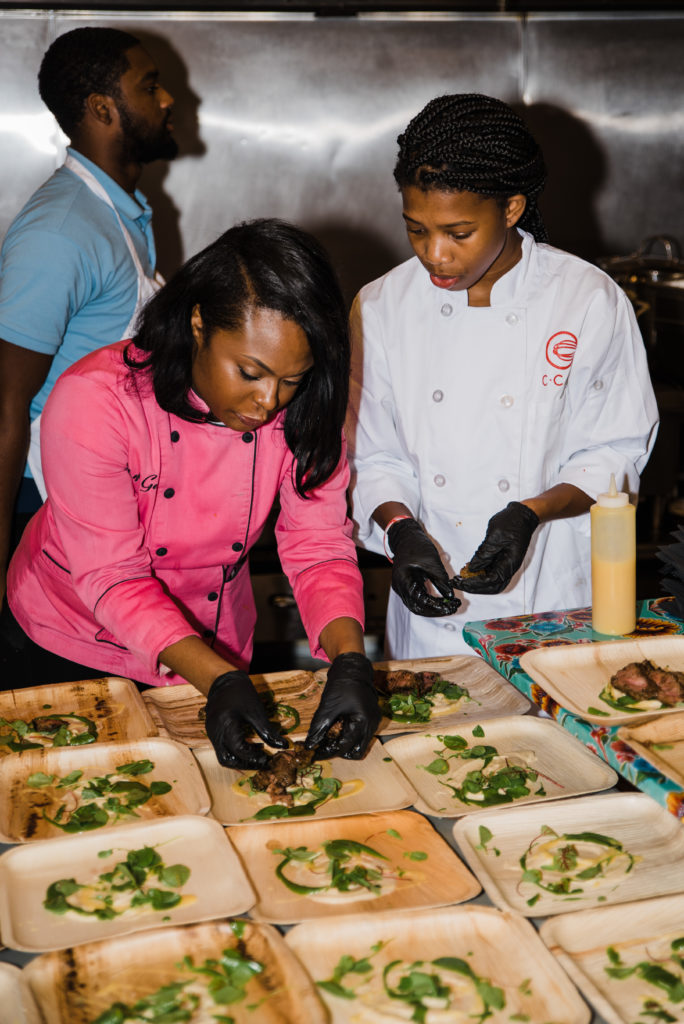
Ticket sales for Cooking for the Culture help raise money for the Careers Through Culinary Arts Program, a national non-profit that helps underserved high school students who are aspiring chefs. In Philadelphia, C-CAP prepares 1,000 high school students in 17 schools for college and career opportunities in the restaurant and hospitality industry. At both of the dinners I attended, C-CAP students were working in the kitchen. “I want to be there for a kid who thinks, ‘Hey, I want to be a chef, but I don’t have someone who looks like me to model myself after,’” Milligan says.
Even though many of his collaborators are accomplished kitchen professionals—sous chefs or line cooks—Milligan said having the spotlight on them, serving a special, multi-course dinner to a packed dining room, can be a new experience for a young chef. “Having their name printed on a menu was a first for a lot of them,” he said.
This was the experience at the second Cooking for the Culture dinner that I attended, at 1149 Cooperative, in the Italian Market. The menu that evening was prepared by 29-year-old Gera Robinson, who runs Posh Kitchen, a boutique catering and personal chef company. “The focus was more on me than I’d ever experienced. I had to own this menu,” she told me. “It was a day of learning experiences. I was really nervous.”
“I want to be there for a kid who thinks, ‘Hey, I want to be a chef, but I don’t have someone who looks like me to model myself after,’” Milligan says.
This nervousness was not evident to the diners, because Robinson’s five-course dinner was truly delicious: jollof rice fritters spiked with berbere, an Ethiopian spice; a stew of mussels in coconut curry sauce; an amazing gumbo of oxtails, lamb necks, and crab, and perfectly-spiced jerk chicken. Robinson’s skill and creativity showed in what that jerk chicken was served atop, a flavorful collard green risotto. Instead of typical chicken or vegetable stock, Robinson prepared the risotto in the stock that remained after boiling the collard greens with turkey necks. This collard green risotto was not soul food, though it borrowed elements of soul food. And it was not Italian, though it was clear the chef had mastered this pillar of Italian cooking. This wonderful, surprising dish was something else entirely—which is what Cooking for the Culture is all about.
![]()
Across the country, a new generation of black chefs is fighting for more visibility and more leadership opportunities. A few years ago in Charlotte, N.C., for instance, Michael Bowling and several fellow chefs founded the Soul Food Sessions, which hosts pop-up dinners to highlight black chefs along the East Coast. When Edouardo Jordan’s soul-food-inspired JuneBaby, in Seattle, won the James Beard Foundation’s award for Best New Restaurant (and Jordan himself won for Best Chef: Northwest), it felt like a step in the right direction.
But there is clearly much work still to be done. According to the Bureau of Labor Statistics, almost 14 percent of food service workers in 2017 identified as black or African American. But most of those jobs are in the lower ranks of fine dining. A 2015 study published by Restaurant Opportunities Centers United, titled “Ending Jim Crow in America’s Restaurants,” found that 81 percent of management jobs in 133 fine-dining restaurants were held by white workers. It also found that workers of color receive 56 percent lower earnings when compared to equally qualified white employees.
Milligan started Cooking for the Culture to showcase and promote the talent of Philly’s young black chefs. The series was an immediate success, selling out more than 60 tickets for each event. “We were supposed to do one dinner. I never thought this would trump all my other projects,” said Milligan
After Robinson’s dinner, I had a chance to speak with Kwame Onwuachi, who will visit Philadelphia to promote Notes from a Young Black Chef at the Free Library on April 10. Elijah Milligan will be interviewing Onwuachi on stage.
Onwuachi and I spoke about Cooking for the Culture’s mission to avoid soul food, and he said that he understood the impulse: “You don’t want to get pigeonholed into a category because of the color of your skin.”
![]()
In his book, Onwuachi recounts the painful experience of opening his highly-anticipated, but short-lived Shaw Bijou in D.C. in 2016. Before its opening, the price of Shaw Bijou’s 15-course tasting menu, $185 (and with beverage pairing, the cost quickly topped $500) faced an over-the-top, vitriolic anger—odd in a town full of expensive restaurants. After a number of negative reviews and publicity, Shaw Bijou shuttered after less than three months. Onwuachi writes: “But the thought still lurks that the hate had something to do with the fact that I was making food that came from my culture, from black culture. I was saying that this culture is worth something, worth a lot, actually. That I was worth something. Underneath the reaction to this price tag, this was the white-lash rage that seethed.” Onwuachi has since bounced back to acclaim and critical praise for Kith and Kin and his fast-casual concept, Philly Wing Fry, which offers innovative twists on the Philly cheesesteak.
During our conversation, I asked Onwuachi a question he will clearly be asked dozens of times on his book tour: What is your advice to a young black chef? “My advice to a young black chef is to stay true to yourself, and don’t let anyone tell you what can’t do,” he said, adding: “Which is also my advice to any young chef.”
Jason Wilson is The Citizen’s 2019 Jeremy Nowak Fellow, funded by Spring Point Partners, in honor of our late chairman Jeremy Nowak. He is the author of three books, including most recently Godforsaken Grapes, series editor of The Best American Travel Writing, and writes for the Washington Post, New York Times, New Yorker and many other publications.
Photo via Kenneth St. George


